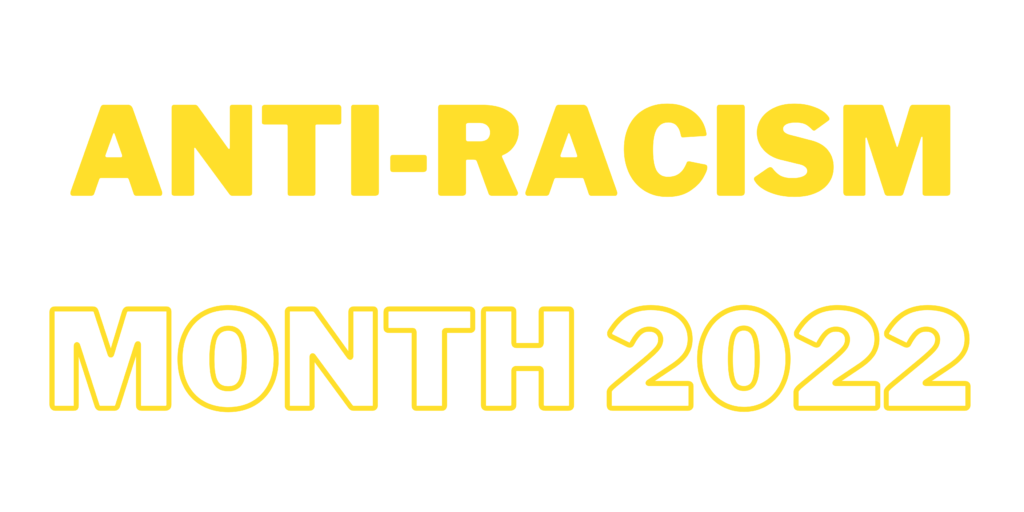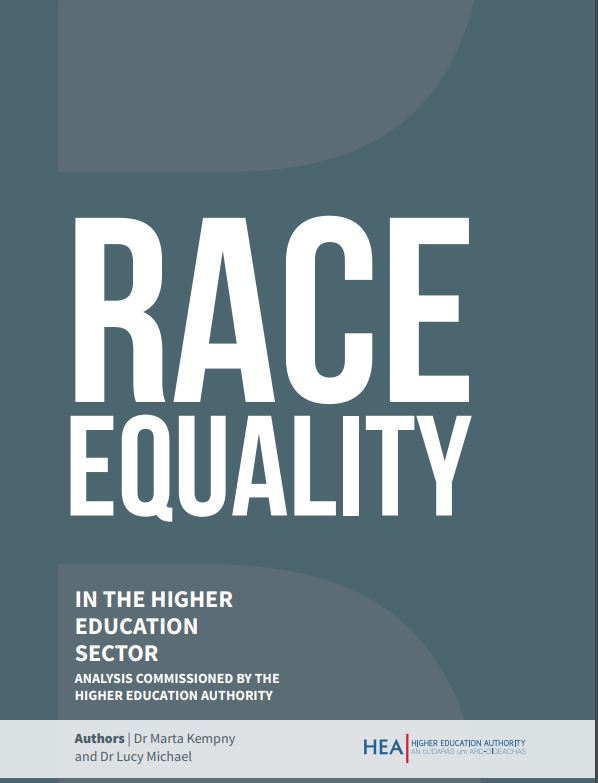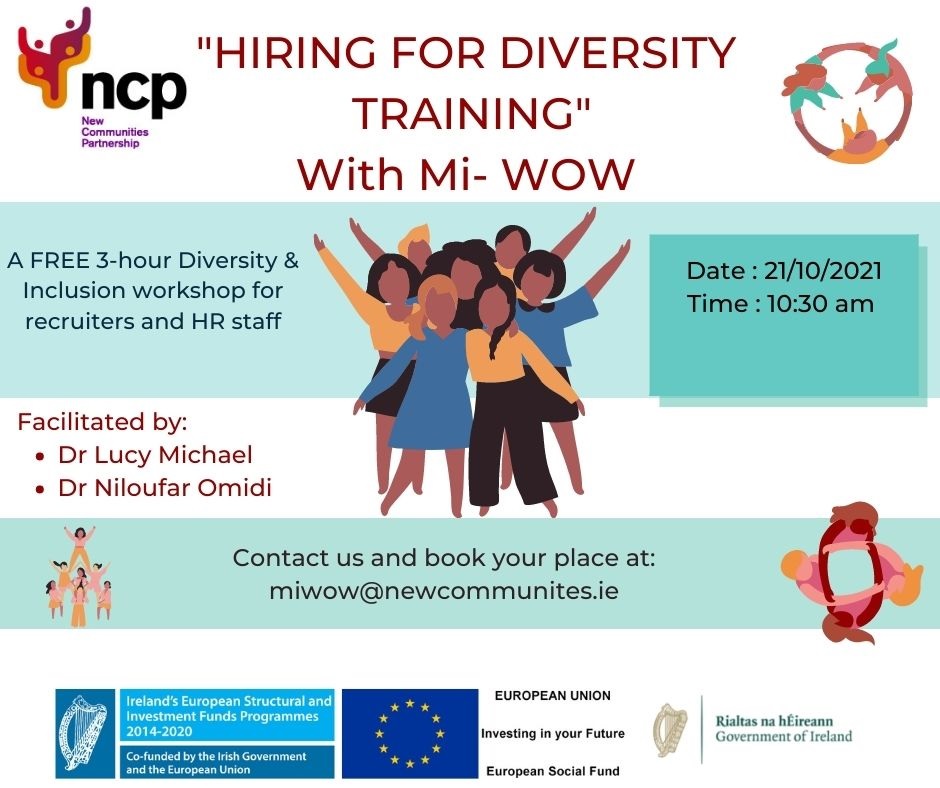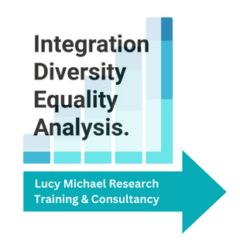Dr Niloufar Omidi spoke to Balbriggan International Women’s Day 2022 on the topic of bias, women’s rights, and how women’s rights are affected by gender bias internationally, at Aster Family Resource Centre. Many thanks to Betsy Abu for the invitation to join an incredible line-up of speakers.
Images
Planning for Anti-Racism Month events

Receiving a few queries this week about how to run events for Anti-Racism Month in March… a few quick thoughts.
If you’re organising events at work for anti-racism month in March, a few tips…
1. There are lots of online events going on for March – you might think about attending one as a group in your organisation and following it with a zoom/teams discussion in-house.
2. If you are planning a panel, particularly if you are looking for representation from minority communities, I suggest that you offer a speakers fee upfront with your invitations. This is a respectful approach. Too often this burden falls on invited speakers to request it.
3. Design your events so that they go beyond awareness to identify key actions – e.g. theme events around working practices & processes, rather than discrete minority identities.
This allows you (1) to move from awareness into action quickly, and (2) facilitates a more intersectional approach to understand how practices and processes in your organisation are experienced by individuals.
4. Support your guest speakers. They should not feel alone at the front of a defensive room. Plan with them, prep your audience, support your speaker actively. Tell them about the organisation, your EDI aims, check you’re on same page. Don’t misrepresent your capacity for change.
5. Go to other events, and look for good practice. Don’t organise an anti-racism event if you don’t know what good practice looks like. Ask for advice from other organisations, attend their events. Read up.
6. What are you trying to achieve? Can you do that in a one-hour session at lunch (probably not)? If you need a half-day to leverage change, take a half day. If you need several events to help your audience progress, plan a series and communicate that colleagues should attend all
7. Get buy-in from the top. Leadership is key. Ask your VP to be present, to welcome the guest speaker and to stay for the whole session. It matters that senior leaders are seen to be there and take it seriously. Seriously, it matters.
8. What’s next? Have you got a goal for where you’re going with this? If you’re just ‘raising awareness’, I need to break it to you… it’s not enough. Raising awareness is a fop for not doing anything about it. Do something. Anything. Plan to do it, and do it.
9. If you want to know about racism in your country, partner with a local organisation for training. Context matters, most UK/US organisations don’t know Irish context. If you want to know about EDI progress in your industry, invite an industry leader.
New survey for the Church of Ireland on Ethnic Diversity, Inclusion and Racial Justice
A new survey seeks to gather the views of members of the Church of Ireland on ethnic diversity, inclusion and racial justice. The initiative of the Archbishop of Armagh and Primate of All Ireland, the Most Revd John McDowell, follows discussions with members and clergy and those serving in lay ministry from a wide range of ethnic backgrounds on the progress made within the Church on drawing on our rich diversity.
At the Church of Ireland’s most recent General Synod in September 2021, the Archbishop said: “It was a little troubling to hear about how we had not drawn anything like deeply enough on the rich diversity of backgrounds in our Church. The meeting had also helped me to understand how difficult it can be to be a person of colour on this island and even, at times, in our Church.”
The research now being carried out has been designed in collaboration with the group of ethnically diverse clergy and lay readers who have now met on a further occasion, and will, along with other strands, examine and make recommendations on how the Church of Ireland can become truly a place of welcome for those from every ethnic background, both lay and clergy.
Our team has worked with the Archbishop and working group since last year, considering the range of initiatives in this area undertaken previously and examining how to move forward on an all-island basis with the support of the wider Church membership. The Archbishop hopes to publish the results of the report and recommendations at the upcoming General Synod 2022.
Work with us

We would be delighted to receive your CV and letter of interest if you would like to work with us.
Our roles will vary depending on project funding available at any particular time and contracts will be offered accordingly.
We are interested in the following experience at present:
Social sciences research (Masters degree and above)
Events and communications
Executive assistant
All of our roles are currently remote working, with attendance at project events from time to time.
We are an equal opportunities employer and we value your potential contribution to our team. Please let us know if you have any accessibility needs and how we can support you in our workplace.
Attitudes to immigrants – what value for survey research?
Recently, we commented on the latest IPSOS Global Trends 2021 study, in which researchers posed the folowing statement to members of the Irish public “There are too many immigrants in my country”. Such statements in research surveys are a common way of establishing attitudes amongst the wider public towards migrants. There are, however, some implications of these questions which have to be considered in their interpretation.
Firstly, it is helpful to point out that the statements themselves can be reproduced quite problematically in the media on the publication of such survey results. I found Sorcha Pollak’s approach very welcome in her discussion of these results and I’m grateful for her efforts to interrogate them.
Who is ‘an immigrant’? As Dr Amanullah DeSondy points out to Sorcha Pollak in this Irish Times article, participants often jump straight to thinking about “a black or brown person” when they think of migrants. So is it problematic that the survey does not ask a person to think of ‘all’ migrants? Given that we commonly have an idea of who is being talked about as ‘immigrants’ in political discourse, or in the chat in the parents group on WhatsApp or down the local pub, it is sensible that the survey seeks to capture exactly that sentiment in the research itself. The presentation of the results, however, leaves something to be desired if it does not address that point. Immigrants from the USA, UK, Australia or New Zealand are rarely complained about in the way that migrants from other countries are.
Far-right political groups (and often some mainstream groups using racism to get elected) point to the supposed drain on public services such as education, health or housing that immigrants produce. The framing of this is key – immigrants ‘drain’, while citizens ‘use’. Public services which are under pressure for other reasons (e.g. a housing crisis) are often the targets of anti-immigrant sentiment. That was evident in emergence of housing protests in Mulhuddart recently, despite County Council assurances that there was no ‘queue-jumping’ by migrants on the housing list. ‘Houses for the Irish’ has been an increasingly heard sentiment here during the housing crisis, as ‘Jobs for the Irish’ was popular during the recession post-2009. The framing of these issues in anti-immigrant sentiment is not only by far-right groups. The motivation for the Citizenship referendum of 2004 came directly from Government, not from the public. During the recession, Government made calls on immigrants to ‘go home’, ignoring that many had made Ireland their home in previous decades with all the intimate connections and long-term investments that this entails.
Attempts in anti-racism campaigns (particularly ‘myth-busting’) to point to the contributions made by migrants to a society have mixed efficacy, since myths about immigration are often adopted as beliefs along with emotional resonance with the issue.
Extreme views on immigration have tended to be relatively consistently captured in public attitude surveys. It is rare in the last decade to see extreme views at more than 10% of any survey on immigration (usually tipping about 6-7% in Europe). These appear to be relatively unaffected by fluctuations in the middle ground.
But there are key moments when public sentiment changes significantly in the middle ground, and surveys can capture that. We noted for example that in the Northern Ireland Life and Times Survey results after the 2016 Brexit vote, sentiment towards migrants was much more positive, even in the context of public services under pressure. This followed widespread discussion of the need for migrants in the workforce in media across the range of political viewpoints. Sentiments can also be changed by conditions outside a country’s own policies – in Ireland, for example, half of tabloids sold daily are UK-owned and contain high levels of anti-immigrant sentiment. American-influenced anti-immigrant sentiment is increasingly evident in Irish online forums since 2016, when Trump was elected in the USA.
Another statement put to participants in the IPSOS Global Trends survey which is useful is “people from different backgrounds and ethnic minorities in my country are treated fairly”. This statement, in its broad assertion, captures a range of experiences, which might include hate speech or racist incidents, but also state racisms, which are rarely captured elsewhere. Just 46 per cent of Irish people agreed with the statement this year.
Frequently, the public is ahead of Government on positive sentiment towards immigrants. We have seen that repeatedly in Ireland in recent years, as public campaigns for increased refugee reception and improved conditions for asylum seekers and undocumented migrants have proved popular and effective. The 81 per cent of Irish people who agreed that “my local area is a place where people from different backgrounds get on well together” (compared with just 65 per cent in Germany) reflects other research we have conducted recently that shows white Irish and ethnic minorities mix well in local communities, despite a historically laissez-faire approach by Government to integration.
Crude as they may be, Government look to surveys like the IPSOS Global Trends survey for consistent feedback on their position regarding immigration. Interrogating the utility of the questions posed, and how the results can be interpreted, is a crucial part of informing Goverment or civil society action that might follow.
2021 in review

HUGE THANKS to everyone who worked with us in 2021.
It’s been an incredibly busy year for us, and a very satisfying one! We added two full-time staff this year, and have employed a further 9 project staff. And we hope to continue to further our work on equity, inclusion and justice in 2022 with an expanded team!
Our clients this year in Ireland, the UK and Europe included:
- International Organisation for Migration
- Higher Education Authority
- Department of Education
- Maynooth University
- Trinity College Dublin
- NUI Galway
- Irish Network Against Racism
- Coalition of Disabled People’s Organisations
- Irish Deaf Society
- Irish Council of Civil Liberties and Irish Refugee Council
- European Network Against Racism
- EU Fundamental Rights Agency
- Church of Ireland
- New Communities Partnership
- Belfast City Council
- Fingal County Council
- Irish Wheelchair Association
Policy windows or open doors? How does anti-racism get into education?

The Centre for Human Rights and Citizenship Education, DCU Institute of Education, is delighted to invite you to the fourth annual ‘Brian Ruane Lecture on Human Rights and Human Rights Education’ to be held on Thursday, 9th December, 2021 at 6pm. This year’s lecture, Policy windows or open doors? How does anti-racism get into education?, will be given by Dr Lucy Michael.
While education is often espoused as a solution to racism, efforts to create anti-racist education systems often meet with great resistance. Racism is reflected in and reinforced by our education system in a wide variety of ways, and only an explicit effort to address systemic discrimination will reduce the complicity of our education system in its reproduction.
Drawing on the experiences of students and teachers in Ireland of trying to address racism, Dr Michael explores the extent to which the Irish education system appears open to those explicit efforts towards change. How well are the systemic effects of racism understood, and addressed, in state and activist responses to racism in education? And why are we seeing such slow progress in key areas, despite the availability of international good practice to follow?
Time: Thursday, December 9th, 6pm – 7pm
Location: The event will take place this year online
Register in advance for this webinar:
https://dcu-ie.zoom.us/webinar/register/WN_vrVqtBU8S1qUA-QkaV5aLw
After registering, you will receive a confirmation email containing information about joining the webinar.
Ground Breaking Race Equality Report on Higher Education in Ireland

Published 18 October 2021 by the Higher Education Authority (HEA)
The Higher Education Authority (HEA) today published its new report Race Equality in the Higher Education Sector, authored by Dr Marta Kempny and Dr Lucy Michael. This report captures, for the first time, quantitative and qualitative data on the race and ethnicity of higher education staff as well as their experiences at work.
The report is based on a survey taken by over 3000 staff in higher education institutions across Ireland during December and January. The aim of the survey was to capture the lived experience of HEI staff in relation to race equality. Participants described their experiences of reporting abuse, stereotyping, and at times, the lack of recognition for their work.
Key findings include:
- More than one-third (35%) of minority ethnic third-level education staff say they have been subjected to racial or ethnic discrimination on campus.
- Less than half of minority ethnic staff are on full-time contracts, compared to 38% of white Irish and 25% white other not on full time contracts.
- Just over 17% of minority ethnic staff earn over €75,000, compared to 38% of white Irish and 25% of white other
- Some 71% said they feel they are treated equally by their colleagues, irrespective of their background
- 69% said they are treated equally by students, irrespective of their background
- Few white staff have reported experiencing racial or ethnic discrimination, but all groups reported witnessing racial or ethnic discrimination against minority ethnic staff
- More than half of respondents (52%) said they had never seen or heard the use of racist language on campus or online, while 27% said they rarely have seen such instances. However, staff across all ethnic groups described witnessing racial or ethnic discrimination against ethnic minority staff.
Recommendations are made in 8 key areas:
- Leadership
- Supporting Diversity in Staffing
- Making Race/Equality Policies Transparent
- Reporting Mechanisms
- Awareness and Training
- Fostering Diversity in HEIs
- Supporting Diversity in Student Recruitment
- Data Collection
The findings are potentially significant for colleges on a financial basis, given that future research funding for colleges will be influenced by progress on equality. In particular it will help us to understand and address the institutional policies, processes and practices which embed and reproduce inequalities between staff of different backgrounds.
In this way the HEA report is also an important educational resource in highlighting the fact that racism is not just about overtly racist actions, such as racial harassment and hate crime, which unfortunately are still a problem in our society.
Dr Ross Woods, the Senior Manager of the HEA Centre of Excellence for Equality, Diversity and inclusion, said: “Now that we have an evidence base, the HEA can work with institutions to prevent rather than react to problems in this area and to keep pace with wider demographic changes in Irish society.”
The full report is available at: https://hea.ie/2021/10/18/first-ever-race-equality-survey-shows-opportunities-exist-for-higher-education-institutions-to-lead-on-tackling-discrimination/
Dr Lucy Michael, report co-author, appeared on RTE Morning Ireland to launch the report. You can listen back at:
“Is racial discrimination a problem in our third level institutions?”, RTE Radio 1. Available at: https://www.rte.ie/radio/radio1/clips/22018627/
The report also featured on the front pages of the Irish Times, Irish Independent and Examiner. If you’ve missed the publications around the HEA Report and the responses to it, you can find some of the major headlines below:
- “Ethnic minorities in higher education more likely to be on lower pay”, The Irish Times. Available at: https://www.irishtimes.com/news/education/ethnic-minorities-in-higher-education-more-likely-to-be-on-lower-pay-1.4703011
- “Minority ethnic university staff struggle with racial stereotyping and lack of recognition for work”, Irish Examiner. Available at: https://www.irishexaminer.com/news/arid-40723287.html
- “Third of minority ethnic university staff subjected to racial discrimination on campus”, Irish Examiner. Available at: https://www.irishexaminer.com/news/arid-40723338.html
- “Ethnic minority staff face discrimination on campus”, RTE. Available at: https://www.rte.ie/news/2021/1018/1254321-race-equality-third-level/
The Irish Universities Association has welcomed the publication of the report.
“IUA welcomes publication of HEA Report on Race Equality in Higher Education as universities roll out ‘Let’s Talk About Race in the Higher Education Sector’”, Irish Universities Association. Available at: https://www.iua.ie/press-releases/18-10-21-iua-welcomes-publication-of-hea-report-on-race-equality-in-higher-education-as-universities-roll-out-lets-talk-about-race-in-the-higher-education-sector/
‘Hiring for Diversity’ Training for Employers and Recruiters

Training for employers and recruiters from New Communities Partnership Mi-Wow (Migrant women into work) Project
We will be delivering a free 3 hour introduction to recruiting diversity of talent, handling qualifications & work permits, addressing equality issues and benefitting from diversity in your team. Group size is limited to 15, to ensure a truly interactive training focused on your learning needs.
Next Dates:
- 21st October, 10.30am – 1.30pm, online
- 7th December, 10.30am – 1.30pm, online
Register by emailing miwow@newcommunities.ie
Feedback from previous participants:
“Thank you; this was incredibly helpful. I really liked that it was so orientated towards things we can do as institutions, as individuals who have a part in shaping the institutions, and as individuals inside institutions.”
What will you learn? Here’s what one participant told us were his takeaways:
- 1. Speed creates bias – Given also that unfamiliarity leads to high anxiety, has your hiring for diversity been well thought through, with robust process and criteria, and definitely not rushed?
- 2. Systems must help – Both organisational recognition and local mapping of foreign qualifications, and knowledge of work permits are critical. Is your application system currently providing sufficient opportunity for additional narrative, also around experience?
- 3. End-to-end inclusion encouragement – From the job spec through to the interview form and beyond, is your hiring process encouraging an inclusive approach throughout?
- Final thought. When workplace teams reflect their target customers, the entire team is twice as likely to innovate. Fact.
We look forward to meeting you in our next training!
A quick look back… attitudes and racism in Northern Ireland
If you’ve missed the series of publications written for the ARK Research Centre of Queens University Belfast and Ulster University, you can review the most recent reports on attitudes to ethnic minorities, migrants and refugees here.
- A video of the Black Lives Matters? Attitudes to minorities and migrants in Northern Ireland webinar held on 27 January 2021 is available. The speaker was Lucy Michael, and Raquel McKee (African and Caribbean Support Organisation for Northern Ireland) gave a response.
- Attitudes to migrant workers in Northern Ireland: an improving landscape? (Research Update 131) and video by Lucy Michael
- A welcoming Northern Ireland? Understanding sentiment towards asylum seekers and refugees by Lucy Michael and Paula Devine (Research Update 124) is based on data from the 2017 Life and Times and Young LIfe and Times surveys.
- Attitudes to minority ethnic groups in Northern Ireland, 2005-2016 by Paula Devine (Research Update 122) focuses on Life and Times data from 2005 to 2016.
- Racism and intolerance towards minority ethnic groups in Northern Ireland by Lucy Michael (Research Update 112) is based on data from the 2015 Life and Times Survey.
